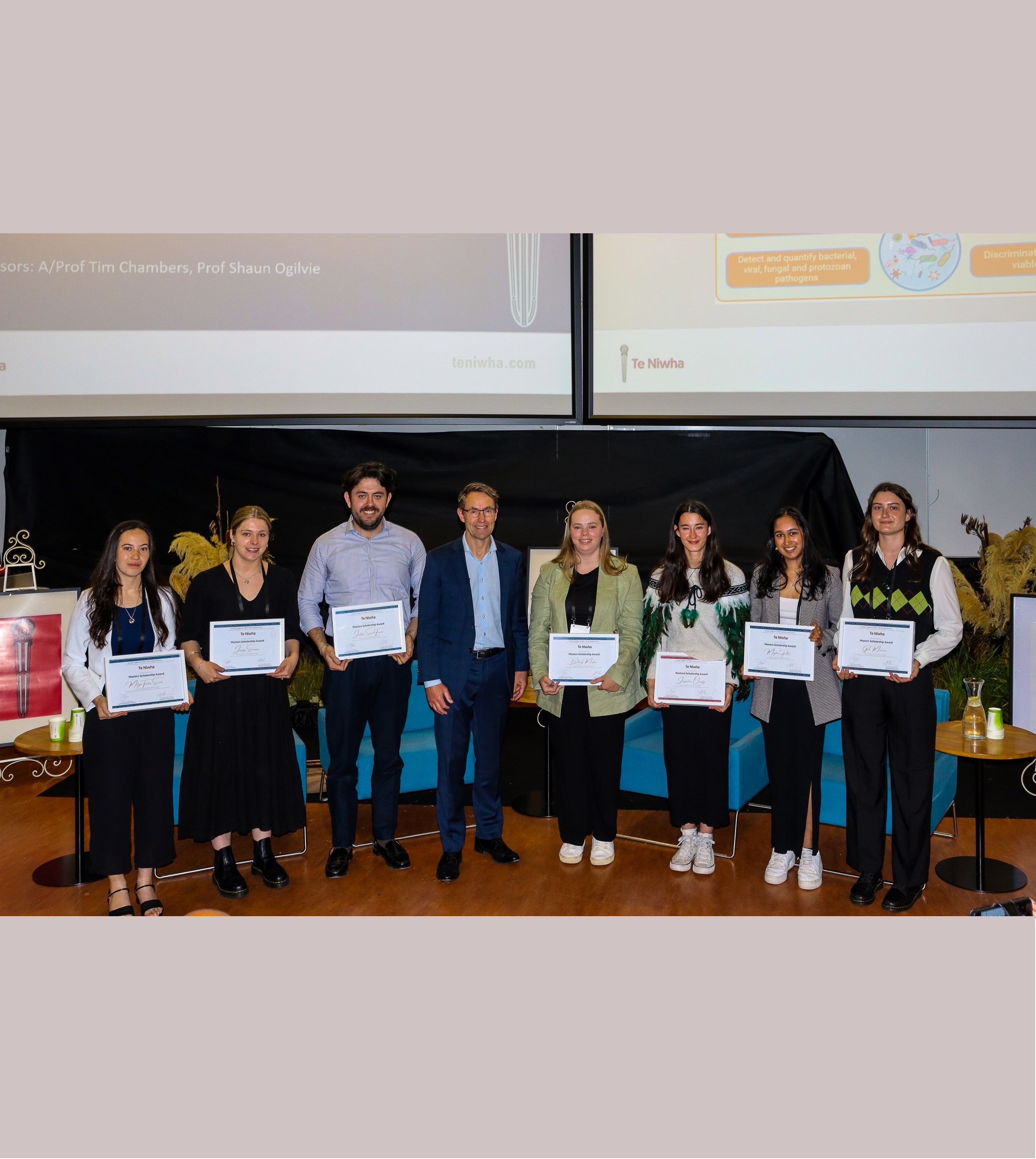Developing antiviral treatments for diseases likely to reach Aotearoa New Zealand as its climate heats up and testing the effectiveness of a native plant to treat skin infections and inflammation are two of the projects being undertaken by talented scientists awarded Te Niwha Scholarships.
This year Te Niwha has awarded Scholarships to seven researchers to enable them to undertake postgraduate study in vital infectious diseases-related research.
In addition to the students developing new antiviral treatments and harnessing the power of rongoā Māori, four other scientists awarded a 2024 Te Niwha Scholarship will focus their research on:
- a potential treatment or vaccine for Rift Valley Fever Virus
- identifying genes involved in the survival of an increasingly common antibiotic-resistant bacteria in healthcare settings
- the relationship between drinking water outages and outbreaks of gastro disease
- validating latest technology metagenomics testing as a cost-effective surveillance tool for detecting contaminants in drinking water, and
- ways to improve experiences for whānau with loved ones isolated in intensive care units (ICUs), such as what happened during the COVID-19 pandemic.
Te Niwha is Aotearoa New Zealand’s national infectious diseases research platform and brings the country’s leading scientists together with communities and government agencies to ensure the country is best prepared for any existing and future infectious disease threats. This includes ways to prevent the spread of infectious diseases, improving surveillance for diseases coming into the country or already circulating, developing faster and easier ways to diagnose disease, and developing new treatments and vaccines.
Te Niwha Director Mana Whakahaere Te Pora Thompson says Scholarship recipients represent the amazing talent Aotearoa New Zealand has in its up-and-coming researchers.
Below is information on the Te Niwha 2024 Scholarship recipients and the projects they will undertake.
Masters Scholarship - Meghna Patel
University of Auckland I Waipapa Taumata Rau
Examining the potential of PI3K inhibitors as antivirals for flavivirus diseases such as Zika and Dengue Fever |
Global warming is driving the spread of mosquito-borne viral infections such as dengue fever and Zika (both flaviviruses) beyond the tropics. There have recently been outbreaks of dengue fever in areas such as Northern Europe, which were not previously thought to be warm enough to support the lifecycle of disease-carrying mosquitos.
Predicted temperatures in Northern parts of Aotearoa New Zealand are edging closer to those that will support Aedes species of mosquitoes, allowing dengue fever and Zika transmission here, as has been seen in neighbouring Pacific nations.
There are currently no approved antiviral treatments for either Zika or dengue fever, and no vaccines for Zika, while the two approved Dengue fever vaccines are largely inaccessible for many populations.
To ensure Aotearoa New Zealand is prepared to meet this new health threat head on, safe and effective antivirals to combat these viruses, which carry a significant risk for illness, are urgently required. This Masters project will address the lack of specific treatments.
Masters Scholarship - Matija-Taaitoa Sucich
University of Auckland I Waipapa Taumata Rau
Exploring the bioactivities of tūpākihi rongoā against viral infection and inflammation. |
Tūpākihi, also known as tutu, tū and Coriaria arborea, is a rongoā Māori with powerful medicinal effects. Traditionally used to treat inflammation, pain, strains, and bone fractures, tūpākihi is applied as a balm, dabbed around wounds or added to baths. Tūpākihi, while not as widely known as kawakawa or mānuka, holds promising yet unexplored medicinal properties and may have potential to combat viral infections of the skin and cellular inflammation.
This Master’s project will collect and extract medicinal parts of tūpākihi and examine it for antiviral activities against herpes simplex virus type 1 (HSV-1) which causes cold sores. The student will also examine tūpākihi extracts for anti-inflammatory activities in immune cell lines and assess potential toxicity of tūpākihi extracts. This will help to understand the therapeutic potential of this rongoā.
PhD Scholarship - Jacqueline Ormsby
Te Whare Wānanga o Waitaha | University of Canterbury
Understanding the role of RIOK3 in the immune response to Rift Valley Fever Virus |
Rift Valley Fever Virus (RVFV) is a significant global health threat, causing severe disease in livestock and humans. The virus, which is not yet in Aotearoa New Zealand, leads to nearly 100% abortion rates in pregnant livestock. In humans RVFV may lead to increased miscarriage rates. RIOK3, a protein implicated in the immune response to RVFV is critical but not well understood. This research aims to characterize RIOK3, explaining its role in the antiviral response and pave the way for potential therapeutic interventions.
Masters Scholarship – Janaya Stevenson
University of Otago I Ōtākou Whakaihu Waka
Identify new bacterial drug targets in skin pathogens in vitro and in vivo |
Skin infections affect approximately one-third of the population, with New Zealand experiencing one of the highest infection rates among developed countries. Acinetobacter baumannii is an emerging pathogen, present in Aotearoa New Zealand that poses a significant threat in healthcare settings, particularly due to its role in skin and soft tissue infections. This bacterium is notorious for its ability to develop resistance to multiple antibiotics, making infections difficult to treat. A. baumannii skin infections are often associated with severe outcomes, especially in patients with compromised immune systems or chronic wounds. This research will identify genes that help the bacteria survive and use this information for future drug development.
Masters Scholarship – Brittany Meafou
Te Whare Wānanga o Waitaha | University of Canterbury
Investigating the impact of drinking water outages on enteric disease in Aotearoa |
Systemic failures in drinking water systems can result in significant health risks. The quality of the drinking water network in Aotearoa is sub-optimal and presents a public health risk. Aotearoa faces a major drinking water infrastructure deficit of ~$30-50bn by 2050.This project investigates the relationship between unplanned outages in the drinking water reticulation system and enteric diseases such as campylobacteriosis, cryptosporidiosis, giardiasis, salmonellosis, and E. coli infections. If a significant relationship is found between outages and drinking water quality or enteric disease rates, it could assist water suppliers with prioritising drinking water renewals. The project could also help researchers and policy makers quantify the burden of disease associated with unplanned outages across Aotearoa.
Masters Scholarship – Gabe Mulcare
Te Whare Wānanga o Waitaha | University of Canterbury
Marae drinking water surveillance using metagenomics and qPCR in the Ngāi Tahu Takiwā |
Current microbial water quality testing relies on monitoring for the faecal indicators of total coliforms (TC) and Escherichia coli - 19th century technology that fails to capture the full spectrum of potential pathogens and lacks insight into contamination sources. Metagenomics technology can identify all the genetic material present in a water environment and will be a paradigm shift for drinking water management. While it is now economically and practically feasible to apply metagenomics, there is a pressing need for fundamental science to underpin this tool’s implementation.
This project aims to validate metagenomics testing as a cost-effective surveillance tool to support marae within the Ngāi Tahu Takiwā with the provision of clean, safe drinking water and monitor changes in source water over time.
Masters Scholarship - Jackson Smeed-Tauroa
Medical Research Institute of New Zealand (MRINZ)
Māori whānau experiences of critical illness in Wellington Intensive Care Unit |
Having a whānau member on life support and breathing machine in the Intensive Care Unit [ICU] has serious implications for the wellbeing of visitors, especially whānau. This situation occurred frequently during the COVID-19 pandemic and will likely occur in future pandemics. This study seeks to understand how medical professionals can better support whānau in this difficult situation. As part of the project the student will describe how current practices impact whānau, particularly Māori who are a collectivist culture where being present to care for loved ones is important for the patient and their whānau. Lessons learned from this study will help address challenges posed by future pandemics.



